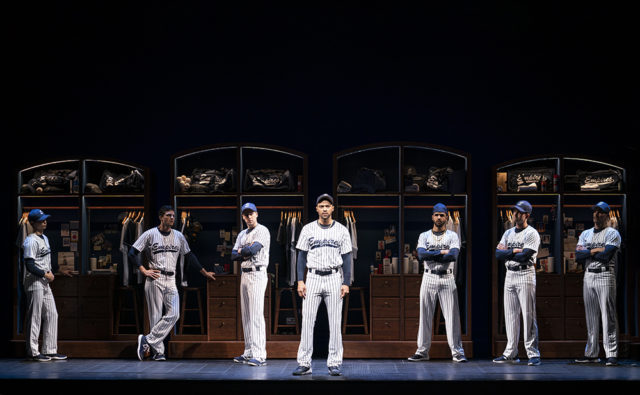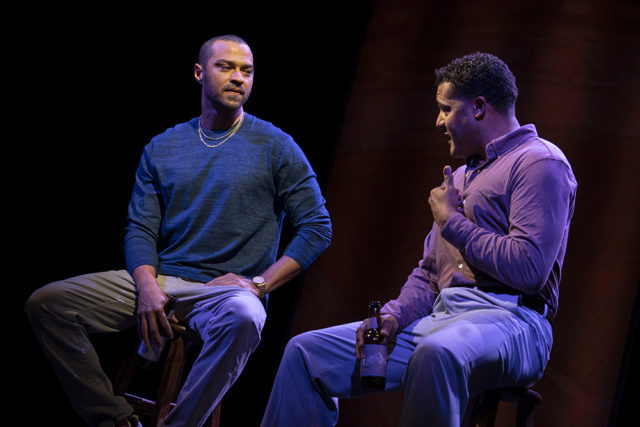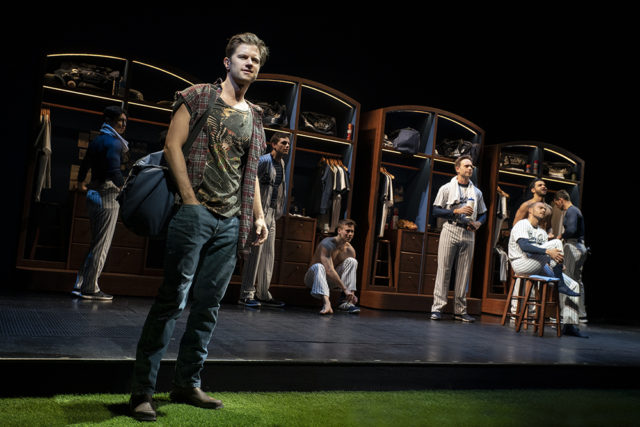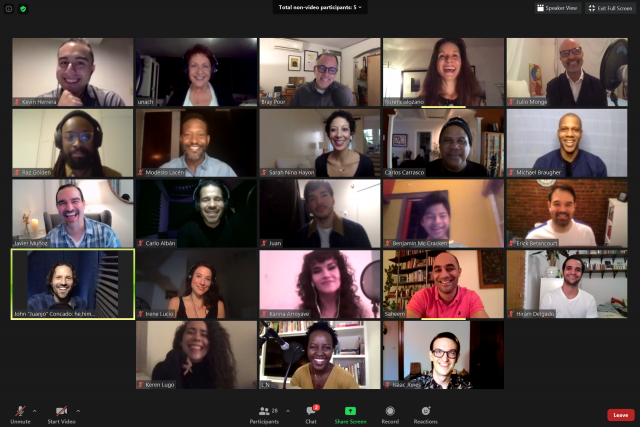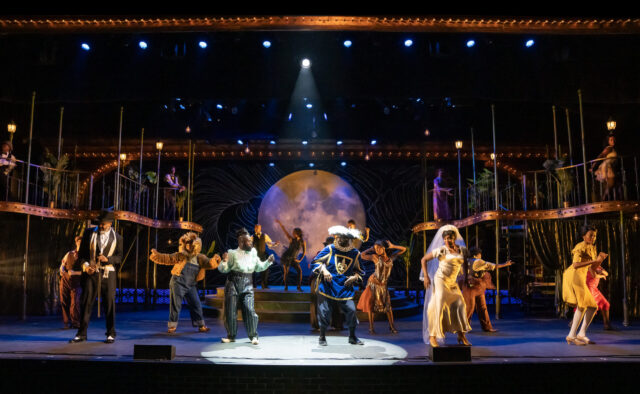
Classical Theatre of Harlem’s A Midsummer Night’s Dream is set during the Harlem Renaissance (photo © 2024 by Richard Termine)
A MIDSUMMER NIGHT’S DREAM
Classical Theatre of Harlem
Richard Rodgers Amphitheater, Marcus Garvey Park
18 Mt. Morris Park W.
Tuesday – Sunday through July 28, free (advance RSVP recommended), 8:30
www.cthnyc.org
The Classical Theatre of Harlem (CTH) celebrates its twenty-fifth anniversary with a rip-roaring adaptation of William Shakespeare’s A Midsummer Night’s Dream, at the Richard Rodgers Amphitheater in Marcus Garvey Park through July 28.
The action shifts between a glitzy two-level club during the Harlem Renaissance and a fairy woodland that feels right at home in the park, amid the setting sun, the wind blowing through the trees, the sounds of the birds and insects, and, the evening I went, a few minutes of light rain that felt like fairy dust.
In the club setting, Theseus (Victor Williams), the duke of Athens, is preparing to wed Hippolyta (Jesmille Darbouze), the queen of the Amazons. He is approached by a nobleman, Egeus (Allen Gilmore), who has promised his daughter, Hermia (Ra’Mya Latiah Aikens), to Demetrius (Brandon Carter), but Hermia is in love with Lysander (Hiram Delgado); at the same time, Helena (Noah Michal) pines for Demetrius, who spurns her. Egeus invokes an ancient law in which Hermia either marries Demetrius or is put to death; Theseus attempts to circumvent that potential fate, with no success.
“Relent, sweet Hermia: and, Lysander, yield / Thy crazed title to my certain right,” Demetrius declares, but Lysander, taking the argument lightly, responds, “You have her father’s love, Demetrius; / Let me have Hermia’s: why not marry him?”
Ultimately, Theseus, against his personal preference, rules in favor of Egeus, giving Hermia three options: accept Demetrius’s hand, be exiled as a nun, or suffer execution. “Then I will die if these are my choices, / But I will never consent to marry a man I love not,” she concludes.
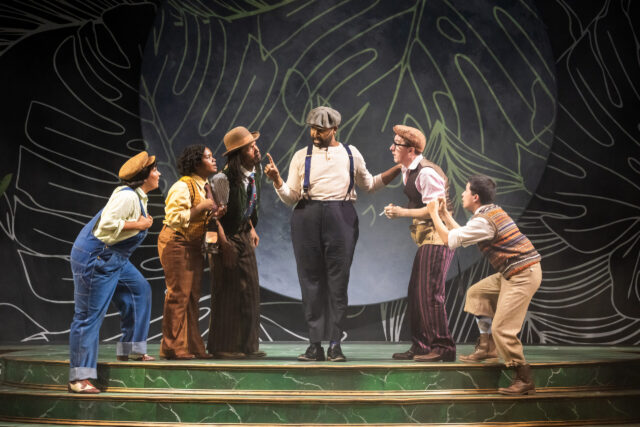
The rude mechanicals rehearse for their play-within-a-play in the fairy woods (photo © 2024 by Richard Termine)
Hermia and Lysander decide to run away together; they share their plan with Helena, who betrays them, believing, “My love for Demetrius is so strong it makes me weak! / And in the woods my true love I will seek!”
In those very woods, a troupe of amateur actors known as the rude mechanicals are rehearsing a play they will be putting on for the duke and queen’s wedding, the tale of doomed lovers Pyramus and Thisbe from Ovid’s Metamorphoses. The cast features weaver Nick Bottom (Jaylen D. Eashmond) as Pyramus, bellows-mender Francis Flute (León Tak) as Thisbe, joiner Snug (Olivia London) as the lion, tinker Tom Snout (Carson Elrod) as the wall, and tailor Robin Starveling (Deidre Staples) as Moonshine, directed by carpenter Peter Quince (Allen Gilmore). All serve as comic relief, as their rehearsals do not go very smoothly.
Meanwhile, Oberon (Williams) and Titania (Darbouze), the king and the queen of the fairies, are looking forward to attending the wedding but they are in the middle of a fight over a young boy (Langston Cofield) they have taken in.
Oberon has his hobgoblin, the sprite Puck (Mykal Gilmore), fetch a purple flower whose juices, when dripped on a sleeping creature’s eyes, make them fall in love with the first living thing they see when they awaken. To prank his wife, Oberon does so with Titania and orders Puck to drizzle the juice on the eyes of Demetrius so he will love Helena, but Puck makes a mistake, and soon Lysander is mad for Helena, Titania is cuddling with a donkey-headed Bottom, and there is chaos everywhere.
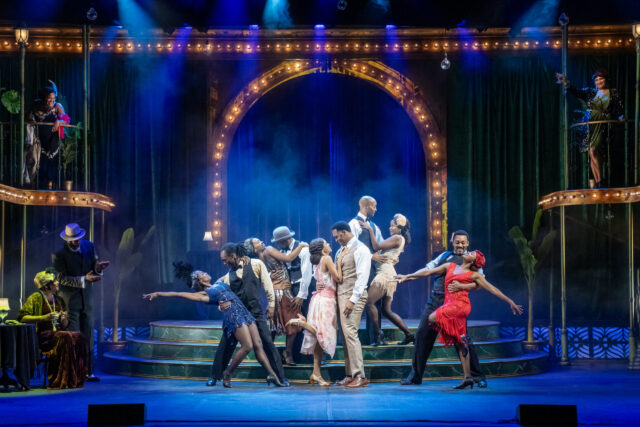
CTH’s Shakespeare adaptation is a glittery enchantment (photo © 2024 by Richard Termine)
A Midsummer Night’s Dream was previously performed by CTH at the Richard Rodgers Amphitheater in 2013; this new production sparkles under the direction of Carl Cofield. The club scenes include fanciful dancing expertly choreographed by Dell Howlett, using both levels of Christopher and Justin Swader’s glittering set, lit with excitement by Alan C. Edwards; a large ensemble, dressed in Mika Eubanks’s colorful period costumes, shakes and bakes to the Jazz Age score. (The hot sound and music are by Frederick Kennedy, with projections of the moon, forest, and other elements by Brittany Bland.)
Cofield focuses on the importance of eyes in Shakespeare’s romantic comedy. Early on, Hermia says, “I would my father looked but with my eyes,” to which Theseus replies, “Rather your eyes must see things as your father sees them!” Helena opines, “Love looks not with the eyes, but with the mind; / And therefore is winged Cupid painted blind.” In the play-within-the-play, Pyramus, upon encountering something that does not please him, cries, “What dreadful sorrow is here! / Eyes, do you see?” And Bottom, waiting for a cue, says, “The eye of man hath not heard, the ear of man hath not seen, man’s hand is not able to taste, his tongue to conceive, nor his heart to report, what my dream was.” When Oberon and Puck use the flower juice, there are giant projections of eyes.
The nightclub scenes burst with life, and everything involving the four lovers is spirited fun. Aikens, Delgado, Michal, and Carter are a formidable quartet, Gilmore is a delightful Puck (and revels master Philostrate), and Williams and Darbouze bring a regal posture to the proceedings. However, the rude mechanicals cannot maintain the pace, occasionally dragging down the momentum. Several scenes go on too long, and the acting is more scattershot, led by an over-the-top, repetitive performance by Eashmond, who alternates as Bottom with comedian Russell Peters. But there is more than enough merriment to make that a minor quibble.
This Midsummer Night’s Dream is just the right play to set your eyes upon to make an already lovely midsummer night that much more dreamy.
[Mark Rifkin is a Brooklyn-born, Manhattan-based writer and editor; you can follow him on Substack here.]
